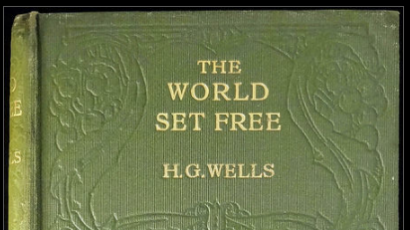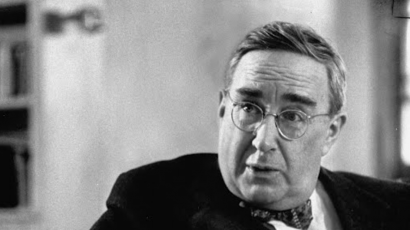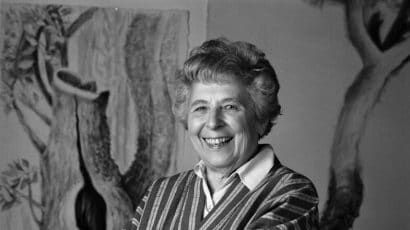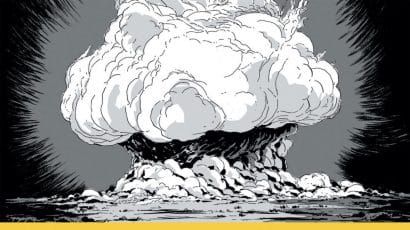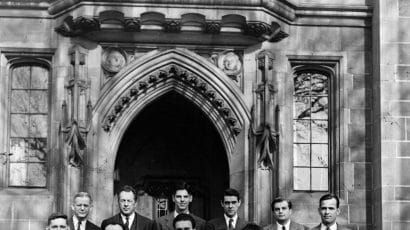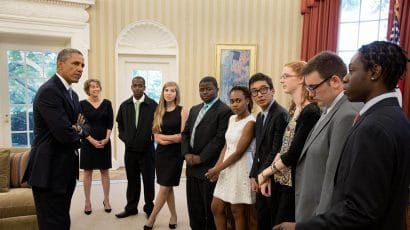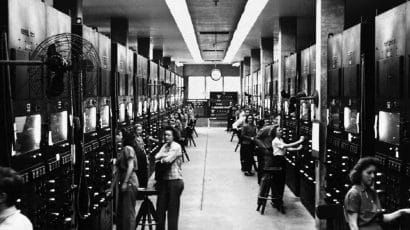Search results for nuclear terrorism
Virtual Tour: Turn Back the Clock “] More than 30 years before the first atomic bombs were made, H.G. Wells‘ 1914 novel, “The World Set Free,” depicted a war where atomic energy fueled powerful explosives. Inspired by the potential applications of new scientific discoveries, science fiction authors like Wells imagine possible future outcomes stemming from … Continued
As election looms, Trump adds to the long story of conspiracy theory in US politics
Trump, like no other president in recent memory, is a card-carrying conspiracy theorist. What's in it for him?
Armas nucleares: el tabú no es suficiente
Desearía poder sostener que el mundo ha incorporado debidamente las lecciones de los bombardeos de Hiroshima y Nagasaki pero, lamentablemente, debo afirmar lo contrario. ¿Por qué? En primer lugar, porque muchas personas en el mundo creen que haber lanzado las bombas -sin importar qué tan catastróficas fueron las consecuencias para la gente de Hiroshima y … Continued
La inutilidad, la aceptación y el avance
Maryam Javan Shahraki y Selim Can Sazak han sostenido un debate intenso sobre el programa nuclear de Irán. Ha sido un microcosmos del debate internacional sobre el mismo tema, en el cual se plantearon muchas preguntas y hubo muy pocas respuestas. Desde mi punto de vista, culpar a Irán se ha vuelto y seguirá siendo … Continued
La inutilidad, la aceptación y el avance
Maryam Javan Shahraki y Selim Can Sazak han sostenido un debate intenso sobre el programa nuclear de Irán. Ha sido un microcosmos del debate internacional sobre el mismo tema, en el cual se plantearon muchas preguntas y hubo muy pocas respuestas. Desde mi punto de vista, culpar a Irán se ha vuelto y seguirá siendo … Continued
Three key misconceptions in the debate about AI and existential risk
A survey identified the most common reasons why people think mitigating the risk of extinction from AI should not be a global priority. Here’s why they’re wrong.
Needed: a bigger toolbox for the IAEA
The basic aims of the Nuclear Non-Proliferation Treaty (NPT) are fairly straightforward: to prevent the spread of nuclear weapons; to provide assurances, through international safeguards, that peaceful nuclear activities will not lead to the production of nuclear weapons; to promote, to the maximum extent consistent with the treaty's other provisions, the peaceful uses of nuclear … Continued
Who sets the Doomsday Clock?
Virtual Tour: Turn Back the Clock “] The Doomsday Clock is set once a year by the Bulletin of the Atomic Scientists. For the first several decades, Manhattan Project scientist and Bulletin editor Eugene Rabinowitch decided when, and how much, to move the Clock. His first decision: October 1949, when Russia exploded its first atomic … Continued
Martyl Langsdorf, designer of the Doomsday Clock
Virtual Tour: Turn Back the Clock “] When artist and designer Martyl Langsdorf, wife of Manhattan Project physicist Alexander Langsdorf, Jr., was hired to design a new cover for the Bulletin, what captured her imagination was the sense of urgency that her husband and other Manhattan Project veterans felt compelled to share with the American … Continued
Existential espionage: How intelligence gathering can protect humanity
Intelligence communities play an important role in analyzing, preventing, and leading efforts to minimize existential risks.
NRC has failed in the past, but there’s still hope for its future
As I’ve mentioned earlier in this discussion, good referees in sports go unnoticed. They consistently and clearly enforce the rules, seldom drawing complaints from either side. Poor referees hear complaints from both sides, albeit not often in response to the same call. Unlike a competent referee, the Nuclear Regulatory Commission (NRC) gets noticed quite often. … Continued
South Asia: Beyond crisis management
Rather than "too much Uncle Sam"—that's how a subheading in Rabia Akhtar's first essay expressed the author's view—the problem in South Asia is "too little Uncle Sam." Akhtar is concerned about India and Pakistan's inability to "grow up" and end their dependence on US management of nuclear crises. I share her concern, but unless Washington … Continued
El bosque es político, pero los árboles son técnicos
En la Segunda Ronda, mi colega Akira Kawasaki abordó el desastre de Fukushima y sus consecuencias para las armas nucleares, mientras que Mustafa Kibaroglu insistió en las reservas de plutonio de Japón. Ambos autores trajeron a colación importantes cuestiones sobre los aspectos técnicos y humanitarios de la seguridad nuclear. Sin embargo, es importante no perder … Continued
‘Trinity: A Graphic History of the First Atomic Bomb’ by Jonathan Fetter-Vorm
Virtual Tour: Turn Back the Clock “] Jonathan Fetter-Vorm’s graphic novel explores the historical development and testing of the first atomic bomb, codenamed Trinity, by scientists including Leo Szilard, who was inspired after reading H.G. Wells’ “The World Set Free.” “One of the things I was most intimidated by was the prospect of drawing what … Continued
How the Bulletin of the Atomic Scientists got its start
Virtual Tour: Turn Back the Clock “] In the aftermath of World War II, a group of Chicago scientists who helped build the world’s first atomic bomb realized they could no longer “remain aloof to the consequences of their work.” They founded the Bulletin of the Atomic Scientists in December 1945 to inform people about … Continued
Un punto de vista desde el Sudeste Asiático
La tecnología nuclear ha sido siempre un tema polémico. Los países que originalmente tomaron la iniciativa para desarrollar y adquirir tecnología nuclear, entendían muy claramente los riesgos que implicaba esa tecnología y con frecuencia han intentado evitar que se sigan difundiendo los conocimientos técnicos en materia nuclear. Otros países, conscientes de los beneficios que la … Continued
Un punto de vista desde el Sudeste Asiático
La tecnología nuclear ha sido siempre un tema polémico. Los países que originalmente tomaron la iniciativa para desarrollar y adquirir tecnología nuclear, entendían muy claramente los riesgos que implicaba esa tecnología y con frecuencia han intentado evitar que se sigan difundiendo los conocimientos técnicos en materia nuclear. Otros países, conscientes de los beneficios que la … Continued
President Barack Obama: People Appeal for Change
Virtual Tour: Turn Back the Clock “] In the 21st century, the threat of nuclear weapons wasn’t in the public eye as much as it had been during the Cold War. People felt more passionately about concerns closer to home: health care, veterans affairs, the local environment. That passion was reflected in the flood of … Continued
The Manhattan Project: The race to build the atomic bomb
Virtual Tour: Turn Back the Clock “] Working in secrecy and in great haste, an army of men and women raced to build the world’s first atomic bomb in the midst of World War II. The code name for their clandestine military assignment: the Manhattan Project. While most Manhattan Project scientists fully embraced the mission … Continued
The militarization of neuroscience
The U.S. military's interest in physics helped produce the Bomb. Now the Pentagon is mining neuroscience for a host of futuristic weapons.
